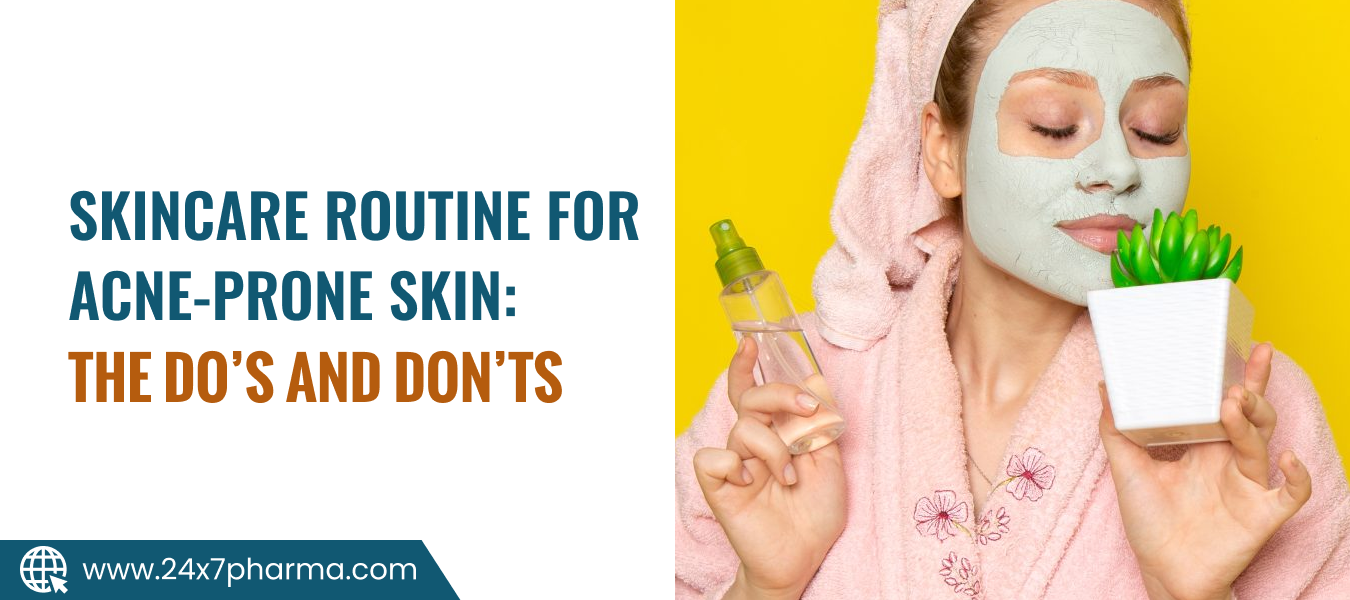Dealing with acne-prone skin can be frustrating, but the right skincare routine can make all the difference. Understanding the do’s and don’ts of skincare ensures that you prevent breakouts and promote healthy skin. In this guide, we’ll explore the best skincare routine for acne-prone skin, backed by expert recommendations. Whether you struggle with occasional pimples or persistent acne, following these tips can help you achieve a clearer complexion.
Do’s: Best Practices for Acne-Prone Skin
1. Cleanse Your Skin Gently
Washing your face regularly is essential, but over-cleansing can strip your skin of its natural oils, leading to irritation. Use a gentle, non-comedogenic cleanser to remove dirt, excess oil, and bacteria. Stick to cleansing your face twice a day—morning and night—to prevent clogged pores without over-drying your skin.
Recommended Products:
- CeraVe Foaming Facial Cleanser
- La Roche-Posay Effaclar Medicated Gel Cleanser
- Neutrogena Oil-Free Acne Wash
2. Use Oil-Free and Non-Comedogenic Products
When selecting skincare and makeup, always choose oil-free and non-comedogenic formulas. These products won’t clog your pores, reducing the risk of breakouts. Look for lightweight, water-based moisturizers to keep your skin hydrated without making it greasy.
Recommended Products:
- Cetaphil Oil-Free Hydrating Lotion
- Neutrogena Hydro Boost Water Gel
- Paula’s Choice Oil-Free Moisturizer
3. Moisturize Daily
A common myth is that people with acne-prone skin should skip moisturizer. However, hydrated skin helps regulate oil production, preventing further breakouts. Choose a non-comedogenic moisturizer that suits your skin type, such as a gel-based or lightweight lotion.
Recommended Products:
- Aveeno Clear Complexion Daily Moisturizer
- Bioderma Sebium Mat Control Moisturizer
- The Ordinary Natural Moisturizing Factors + HA
4. Apply Sunscreen Every Day
Skipping sunscreen can worsen acne scars and cause premature aging. Use a broad-spectrum SPF 30+ sunscreen to protect your skin from harmful UV rays. Opt for a non-greasy, oil-free sunscreen to prevent clogged pores.
Recommended Products:
- EltaMD UV Clear Broad-Spectrum SPF 46
- La Roche-Posay Anthelios Clear Skin Sunscreen SPF 60
- Neutrogena Clear Face Liquid Lotion SPF 55
5. Incorporate Acne-Fighting Ingredients
Using products with acne-fighting ingredients can help prevent and treat breakouts. Look for:
- Salicylic Acid – Helps unclog pores and exfoliate dead skin.
- Recommended Products: Paula’s Choice 2% BHA Liquid Exfoliant, The Inkey List Salicylic Acid Cleanser
- Benzoyl Peroxide – Kills acne-causing bacteria.
- Recommended Products: PanOxyl Acne Foaming Wash 10%, Clean & Clear Persa-Gel 10
- Niacinamide – Reduces inflammation and redness.
- Recommended Products: The Ordinary Niacinamide 10% + Zinc 1%, La Roche-Posay Effaclar Serum
- Retinoids – Boost cell turnover to prevent clogged pores.
- Recommended Products: Differin Gel (Adapalene 0.1%), Retinol Serum by CeraVe
Start with lower concentrations and gradually increase usage to avoid irritation.
6. Follow a Healthy Diet and Lifestyle
What you eat can impact your skin. A diet high in processed foods, dairy, and sugar may trigger breakouts. Instead, focus on anti-inflammatory foods like fruits, vegetables, and omega-3 fatty acids. Drink plenty of water to keep your skin hydrated and practice stress management techniques to reduce acne flare-ups.
Read More: The Ultimate Acne Guide: Causes, Treatments & Prevention
Don’ts: Common Skincare Mistakes to Avoid
1. Overwashing or Scrubbing Too Hard
Washing your face too frequently or using harsh scrubs can irritate your skin, causing increased oil production and more breakouts. Stick to a gentle cleanser and avoid aggressive exfoliation.
2. Popping or Picking Pimples
It’s tempting to pop a pimple, but this can lead to infection, scarring, and prolonged healing time. Instead, use spot treatments with benzoyl peroxide or salicylic acid to speed up healing.
3. Skipping Moisturizer
Many people with oily skin avoid moisturizers, fearing they will worsen breakouts. However, skipping moisturizer can make your skin produce more oil, leading to clogged pores. Use a lightweight, non-comedogenic moisturizer to keep your skin balanced.
4. Using Too Many Harsh Products
Combining multiple acne treatments, such as retinoids, benzoyl peroxide, and exfoliants, can irritate your skin and cause excessive dryness. Introduce new products slowly and consult a dermatologist if you experience severe irritation.
5. Sleeping with Makeup On
Leaving makeup on overnight can clog pores and cause breakouts. Always remove makeup before bed using a gentle makeup remover or micellar water, followed by a cleanser.
6. Ignoring Professional Help
If over-the-counter products aren’t working, consult a dermatologist. Persistent or severe acne may require prescription treatments such as oral antibiotics, topical retinoids, or isotretinoin.
Conclusion
Maintaining a proper skincare routine for acne-prone skin is essential for preventing breakouts and keeping your skin healthy. Follow the acne skincare do’s and don’ts mentioned above to manage acne effectively. Be consistent, patient, and gentle with your skin. If needed, seek professional guidance to develop a tailored skincare plan. By making small adjustments and choosing the right products, you can achieve a clearer, healthier complexion over time.

